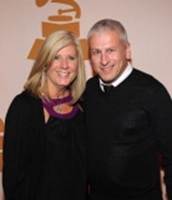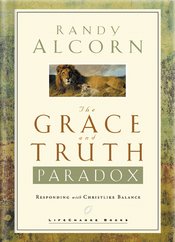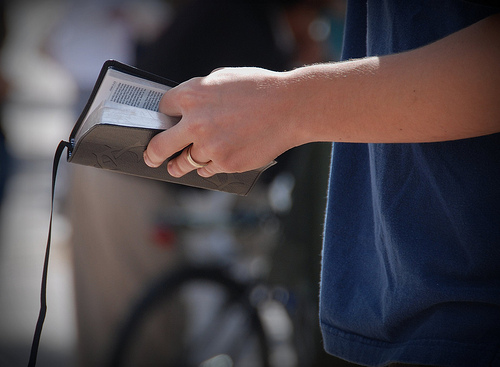Because of his efforts to end human slavery, Louie Giglio was asked to pray at the Presidential inauguration. Louie said, “Though the president and I do not agree on every issue, we have fashioned a friendship around common goals and ideals, most notably, ending slavery in all its forms.”
Last Thursday the internet exploded with the Louie Giglio “scandal.” What was this outrageous revelation? An eighteen-year-old recording of a sermon Louie preached. His sermon actually shows that—wait for it—this Christian pastor believed and taught what the Bible has said, and virtually all Christians have believed, for two thousand years.
Because of this sermon, a homosexual advocacy group protested his place in the inaugural lineup.
After conversations with the White House, Louie withdrew. He said, “It is likely that my participation, and the prayer I would offer, will be dwarfed by those seeking to make their agenda a focal point of the inauguration.”
As I listened to the message, I was struck by the gentleness and kindness of Louie Giglio’s words intended to invite in, not push away, those of homosexual orientation. He offered love and forgiveness for homosexual sin just as for heterosexual sin and every other sin. Giglio was careful to say that people with a homosexual orientation were loved and welcome in his church. Yes, the agenda of homosexual advocates was warned against, and that’s an appropriate warning. But there was no homophobia, no revulsion against homosexuals as individuals. Rather, Louie spoke with both grace and truth.
This 54-minute message is biblically clear yet careful and balanced, saying that homosexual behavior is one of many sins, and we should not hold it out as unacceptable while our personally preferred sins are ignored. It was a good sermon then, and in my opinion, still is.
If this message is “hate speech,” as it is called by some responders, then the Bible is hate speech, and no one can preach the whole Bible without being guilty of hate speech. Some people believe that and are honest enough to say it.
Following Louie’s withdrawal, the White House, via the Presidential Inaugural Committee, said,
We were not aware of Pastor Giglio’s past comments at the time of his selection and they don’t reflect our desire to celebrate the strength and diversity of our country at this Inaugural. Pastor Giglio was asked to deliver the benediction in large part for his leadership in combating human trafficking around the world. As we now work to select someone to deliver the benediction, we will ensure their beliefs reflect this administration’s vision of inclusion and acceptance for all Americans.
In other words, the administration will find someone to replace Giglio as the token religious figure in the program (it is difficult to ask an atheist to give the benediction). Presumably this will be a “Christian” who does not actually believe what the Bible says—indeed, if he or she did, he would likely be outed for it. At very least, it must be someone who does not have sufficient conviction or courage to have ever said in public what the Bible says about various moral issues.
 While Louie Giglio and I haven’t spent a lot of time together, the two times we have talked in person have been rich. In these conversations I saw the Giglios’ depth of love for Christ, for the gospel and for the welfare of others. They have dedicated their lives to serving our King and loving all. It’s hard for me to think of more genuine and caring people.
While Louie Giglio and I haven’t spent a lot of time together, the two times we have talked in person have been rich. In these conversations I saw the Giglios’ depth of love for Christ, for the gospel and for the welfare of others. They have dedicated their lives to serving our King and loving all. It’s hard for me to think of more genuine and caring people.
Several mainstream news articles and many comments express outrage that Louie preached what the Bible teaches. The level of hostility was sometimes off the charts. What I heard said about my brother in these forums does not even faintly resemble who he really is, either in private or in public, or for that matter, what he actually said in the context of his message.
If Louie Giglio, despite his people-loving track record, is viewed as a bigot because he believes and teaches the Bible, then it’s guaranteed you and I will be seen as bigots. Unless, of course, we either outright deny the Scriptures or are so quiet about our belief in them that no one finds us out. (Imagine an ambassador who lives in fear of divulging his King’s policies.)
Many of the articles and comments concerning Louie Giglio reflected this perplexing idea that good Christians must NOT believe the Bible. And, indeed, many professing Christians agree with Jesus only when he speaks about love. When he takes moral stands and says there’s an eternal hell to punish sins, that’s a different story. They take a cut and paste approach to the Bible—when I like what it says I’ll quote it, when I don’t like it, I’ll ignore, reinterpret or deny it. That means the Bible is not my authority. Rather, this culture is my authority. I am my authority.
Once we deny parts of God’s truth, then we are no longer under Scripture’s authority. We are winging it. And if Christians try to be relevant and accepted by making up truth on the fly, then the Jesus we speak of will not be the Scripture-believing Jesus of the Bible who was full of both grace and truth. He will just be the “loving Jesus” remade in our culture’s image, in which we redefine love as tolerance.
Among the comments, I discovered some Christians who seem astonished that the world opposes many Christian beliefs. Of course we will be mocked and despised—the Bible promises us that. Jesus said “A servant is not greater than his master. If they persecuted me, they will also persecute you” (John 15:20). He said, “In the world you will have tribulation” (John 16:33). Paul said, “all who desire to live a godly life in Christ Jesus will be persecuted” (2 Timothy 3:12). Peter said, “Dear friends, do not be surprised at the painful trial you are suffering, as though something strange were happening to you” (1 Peter 4:12).
If we are not opposed for our allegiance to the gospel, isn’t it because we are not living and proclaiming the gospel?
That’s why I get it when homosexual advocates and the world in general don’t believe the Bible or are hostile toward people who do. What surprised me was the shock displayed over a Christian pastor who actually believed the Bible. And actually preached what it says. (Isn’t that what true Christian pastors are supposed to do?)
I saw comments in which several people spoke up in Louie’s defense, but then said, essentially, “Someone shouldn’t be judged for what he’s believed and said nearly twenty years ago. He’s probably changed his mind and we should forgive him. Let’s give him a chance.”
But of course, for Louie to change his position would require him to repent of what the Bible teaches. It’s one thing to say “I was wrong,” it’s another to say, “God was wrong.” To do this, he would not be a Christ-follower in the historic sense. (True Christ-followers don’t deny God’s Word, they lovingly affirm it.) It’s one thing, years later, to say you would phrase some things a bit differently; it’s another to deny what the Bible actually says.
 Trying to fly under the radar of our culture on moral issues is no better than the always-in-your-face method. The grace-only approach, in the end, is as deficient as the truth-only approach. Jesus came full of both grace and truth (John 1:17). So should we.
Trying to fly under the radar of our culture on moral issues is no better than the always-in-your-face method. The grace-only approach, in the end, is as deficient as the truth-only approach. Jesus came full of both grace and truth (John 1:17). So should we.
It concerns me when those who profess to be Christians simply redefine what it means to be a Christian to accommodate whatever the culture currently believes. They oppose Giglio, they suppose, because they are more loving, kind and relevant Christians.
We live in a strange new world in which those who believe in historic Christian morality, who affirm what nearly all Christians everywhere have believed for two thousand years, are now seen as immoral bigots. Those who affirm as moral what has been biblically and historically immoral—including homosexual and heterosexual relations outside marriage—are now seen as taking the moral high ground. They are the people of virtue, since the central virtue is tolerance. People have always committed immorality. There’s nothing new about that. But there was a time when many who did so knew they should repent even when they didn’t. Today, people affirm and preach and celebrate immorality. And they insist that others must acknowledge the legitimacy of their beliefs, or be labeled bigots.
The only way to redeem yourself as a Christian in the eyes of popular culture is to deny what it means to be a Christian. The only way to be a credible pastor is to deny what it means to be a credible pastor. A tolerant culture will not tolerate your Christian beliefs. But, if you recant those beliefs, it might forgive you, in the same way it might forgive former racists.
To be bad is now to be good. To be good is now to be bad.
I see people repeating the often-said and very misleading “Jesus never spoke against homosexuality [or abortion].” Well, not by name, but he also never spoke directly against most sins. Show me what Jesus said about rape, wife-beating, child-molesting, child pornography, arson, torture, forgery or hundreds of other sins.
The truth is that Jesus condemned lust, both heterosexual and homosexual (Matthew 5:28). And in Matthew 19:9 Jesus condemned “porneia,” a broad word that covers all sexual sins condemned in the Old Testament, and others not addressed there. Greek scholars say this includes prostitution, bestiality, incest, child molesting, homosexual relations, and all heterosexual relations outside of marriage.
So Jesus really did speak against homosexual relations without using that exact term. Furthermore, Jesus repeatedly affirmed his belief in the Old Testament Scriptures. He said, “truly I say to you, until heaven and earth pass away, not the smallest letter or stroke shall pass from the Law until all is accomplished" (Matthew 5:18); “The Scripture cannot be broken," (John 10:35); and “Your word is truth" (John 17:17).
So even if you don’t accept that porneia includes homosexual relations, it’s inescapable that Jesus affirmed the same Old Testament Scriptures that consistently condemn homosexual actions along with heterosexual sins of every variety (Genesis 19:5-8; Leviticus 18:22-23; 20:13). Likewise, Jesus’ apostles, who wrote the God-breathed New Testament Scriptures, consistently spoke against homosexual behavior right along with other sins (Romans 1:26-27; 1 Corinthians 6:9; 1 Timothy 1:9-10; Jude 7).
Does this mean we can’t be empathetic and caring about those with a homosexual orientation or who have chosen that lifestyle? Of course not. If someone were outing me on this issue, they could go to my response to a “Lesbian Christian” who argued it’s okay for her to have a sexual partner. Like anything I wrote years ago I would no doubt make minor revisions on it today. But do I think I was hateful, bigoted, unloving and uncaring in what I said to her? I do not. In fact, I’m convinced I was speaking in her best interests, with heartfelt love.
 Too many Christians labor to airbrush Jesus and the Bible, to make them as attractive as possible. In doing so we distort both the Living Word, Jesus, and the Written Word, the Bible. We redefine sin, and minimize it in a misguided attempt to win people by saying what they’d rather hear.
Too many Christians labor to airbrush Jesus and the Bible, to make them as attractive as possible. In doing so we distort both the Living Word, Jesus, and the Written Word, the Bible. We redefine sin, and minimize it in a misguided attempt to win people by saying what they’d rather hear.
What bothered me most as I read dozens and dozens of comments was seeing professing Christians distance themselves from Louie Giglio. These new kind of “Christians” are a mirror image of this culture, craving popularity and acceptance. If that’s you, please understand—and I am trying to be honest, not cruel—that you bear no resemblance to what it has meant for two thousand years to be a true follower of Christ. Believe what you choose to, but please, in the interests of accuracy, stop calling yourself a Christian.
Our job is not to be God’s speechwriters and revise his words on his behalf, but to speak his words humbly. Our job is not to be God’s PR team, but to be his ambassadors, not making policy but simply representing what God has declared to be true.
This episode, I believe, points out the futility of trying to reach the world through being acceptable to the world. If you spent any time with the Giglios, you’d probably think that they are better, nicer and kinder than you are. So if Louie Giglio’s efforts against human slavery haven’t delivered him from moral outrage, your works and mine won’t deliver us. (We should do those works, of course, but out of love for God and people, not to be popular.)
Ask yourself whether you are living for the approval of this culture, or the Audience of One. Ask yourself, “In the end whose judgment seat will I stand before?” The homosexual advocate’s? The White House’s? The news media’s? The social media’s? The church’s? Or will we stand before God’s throne, where His “opinion” (truth), as expressed in Scripture, ultimately will be non-negotiable.
Christ’s followers are full of grace and truth. They are both loving and holy. Make no mistake—an unholy world will never be won to Christ by an unholy church.
P.S. If you’re interested in more perspectives on the “Giglio controversy,” this resource points to eight treatments by different believers.
Photo credit for Bible: Chris Yarzab via photopin cc





